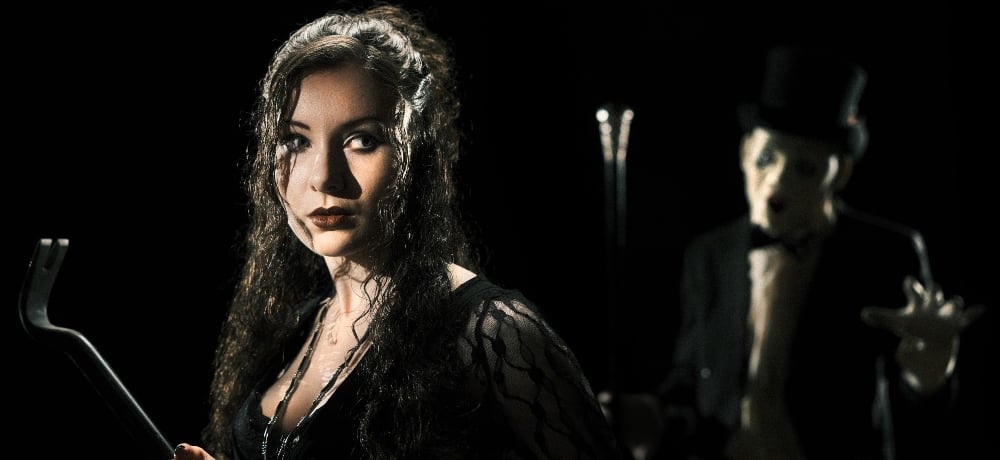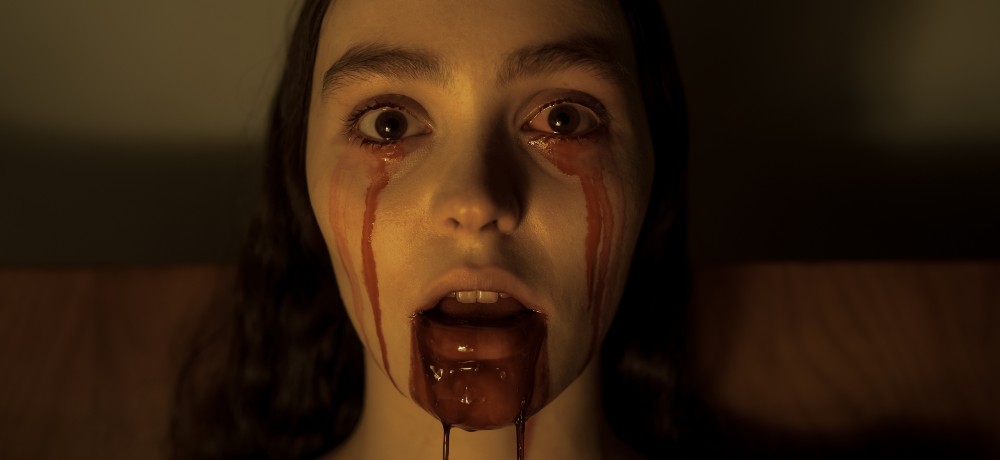






Robert Eggers fought fang-and-nail for roughly a decade to remake Nosferatu. Passion is brimming from Eggers' melancholy interpretation of F. W. Murnau's 1920s vampire classic and Bram Stoker's Dracula novelization. Visual language honors silent film presentations while the film's dreary tone winks at Hammer's horrors, feeding into a captivating stylistic union. It's bleak, beastly, romantic, uncanny, sensual, and feral. Eggers stays faithful to the lumbering mechanisms and meticulous composition that's become his trademark, giving us the Eggers-coded Nosferatu we hoped would prevail.
Nicholas Hoult forgets his Renfield training to portray 1800s German real estate agent Thomas Hutter, destined to serve Count Orlok (an unrecognizable, almost hissing Bill Skarsgård). Lily-Rose Depp stars as Thomas' cursed lover, Ellen Hutter, the object of Count Orlok's dominating affection. Thomas leaves Ellen to meet Orlok in Transylvania, as she rooms with trusted acquaintances Friedrich (a scene-stealing Aaron Taylor-Johnson) and Anna Harding (Emma Corrin). Orlok wastes no time asserting himself as Thomas' "lord," Ellen falls into maddening nightly trances under Orlok's manipulation, and a plague spreads throughout the Hutters' 19th-century city upon Orlok's ominous arrival.
Eggers 60+ fully-built sets bring a Bram Stoker's Dracula level of attention paid to the film's 1800s European locations. Orlok's Transylvanian residence reuses Pernštejn Castle in the Czech Republic, famously seen in Werner Herzog's 1979 Nosferatu, but Eggers doesn't duplicate shots. Striking cinematography accentuates Baroquian appeal with charcoal shadowiness, and textural production design recreates cobblestone avenues or the Demeter's rickety wooden vessel. Eggers's crew erects inhabitable sets for actors to explore, which welcomes viewers into a world filled with gorgeous architecture and painstakingly detailed imagery. There are no cheats here, no workarounds — and that dedication to pre-production craftsmanship shines through despite monochromatic washes.
Director of Photography Jarin Blaschke paints a portrait of moody 19th-century Romanticism. Muted, chilly colors fade in and out of usage, flushed out whenever Nosferatu opts for standout black-and-white stretches with contrast pushed to the max, paying sharp homage to Murnau's antique original. Blaschke's artistry is sublime as he implements symmetry and shadowplay, as are Von Trierian interludes where high art collides with unleashed vampiric mania in quick-cutting spirals into breathless danger. Orlok's cavernous quarters, frothy-mouth guard dogs, and runaway stagecoaches define a tapestry of vampiric traditions rooted in Transylvanian lore. Still, no matter the on-screen subjects, Blaschke shoots with devastating precision.
Skarsgård disappears under six hours' worth of Count Orlok's cosmetic transformation. He's a festering vampiric villain worth awards season consideration, complete with bodily decomposition that depicts the film's parallels of vampirism and rat-spread plagues. Skarsgård feasts upon the perverse nature of Orlok's obsession over Ellen, blending Lothario-esque advances into the Transylvanian creature's personality. Eggers represents Orlok as a disease, this pariah, as do the open wounds and visible pustules all over Orlok. He's meaner, more gaunt, and more terrifying as Eggers imparts identifiable quirks, like Orlok's addiction to sucking blood from his victims’ chests.
Quite surprisingly, Lily-Rose Depp steals Nosferatu. Ellen's recurring fits mimic contortions seen in exorcism movies as Orlok torments the woman of his dreams from afar. Depp writhes wildly, throwing her body into uncomfortable configurations while exerting immense physical strains to depict her character's imprisonment. Ellen's pandamonium is both sensual and scary, as she lustily moans about Orlok's impending visitations, themselves warnings about the pox upon Germany that's to come. Depp plays two roles as Thomas' depressed and lonesome partner, then Orlok's The Exorcist-lite nympho, the gyrating fever-dream iteration of an aristocratic vampire's beloved.
Nosferatu is so many things simultaneously, hence why it's such an enticing production. Thomas' devotion to this supernatural horned-up dearest is a Shakespearing tragedy that Hoult cherishes, while Ellen's tether to Skarsgård's beastly Orlok is an enchanted yet dismal fairy tale. Willem Dafoe's occult metaphysician Professor Albin Eberhart von Franz is the Hammer Horror nutcase, bringing comical levity to the otherwise lovely, dark, and deep romantic chiller. Eggers doesn't saddle himself to any specific subgenre, like a visitor passing through horror approaches. Nosferatu can be legitimately frightening, lunging for the jugular (and ripping into neck meat), or unexpectedly emotional, as Ellen's mental struggles are preyed upon by an inhuman entity. It's predatory, it's gallows-grave, it's creature-forward — it's so many things, as Eggers challenges vampire familiarity and comes out on top.
In rebuttal, Nosferatu is so brazenly Eggers — maybe too brazenly? While it's the filmmaker's most accessible presentation to date, there's a hesitation before reaching total momentum. Storytelling thrives on creeping dread, like waves of rodents slowly taking over a metropolis, but Eggers can get lost in the macabre whimsy of his shuffle-step designs. It's what we've come to expect from a prolific filmmaker who does not budge on personal preferences — and if you love that about Eggers, you're in luck — but the two-hour-plus experience is not without quiet lulls. That is, as stated, with intention. It's more of a problem in the beginning before the film's repetitious setups give way to its eventual cavalcade of freshly rotten ideas.
Nosferatu is Robert Eggers doing his best Guillermo del Toro impression. Horrific origins do not prevent a fantastical romance from becoming a source of ferocious punishment and intense feelings. Characters charge into castles with torches, honoring the communal upheavals against classic villains of eras past, but Eggers' vision boasts more fatal attractions, a damned love story from whence evil crawls. That doesn't erase hallmarks from The Witch, The Lighthouse, and The Northman, which translates into a grand spectacle of outmatched techniques yet still hints at evolution within even the most confident filmmakers. My pacing and length qualms aside, there was no better suitor for a Nosferatu remake — Eggers' perseverance is a win for the horror genre.
Movie Score: 4/5